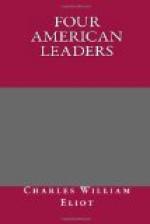Finally, I ask your attention to the striking contrast between the wealth of Washington and the poverty of Abraham Lincoln, the only one of the succeeding Presidents who won anything like the place in the popular heart that Washington has always occupied. Washington, while still young, was one of the richest men in the country; Lincoln, while young, was one of the poorest; both rendered supreme service to their country and to freedom; between these two extremes men of many degrees as regards property holding have occupied the Presidency, the majority of them being men of moderate means. The lesson to be drawn from these facts seems to be that the Republic can be greatly served by rich and poor alike, but has oftenest been served creditably by men who were neither rich nor poor. In the midst of the present conflicts between employers and employed, between the classes that are already well to do and the classes who believe it to be the fault of the existing order that they too are not well to do, and in plain sight of the fact that democratic freedom permits the creation and perpetuation of greater differences as regards possessions than the world has ever known before, it is comforting to remember that true patriots and wise men are bred in all the social levels of a free commonwealth, and that the Republic may find in any condition of life safe leaders and just rulers.
CHANNING
We commemorate to-day a great preacher. It is the fashion to say that preaching is a thing of the past, other influences having taken its place. But Boston knows better; for she had two great preachers in the nineteenth century, and is sure that an immense and enduring force was theirs, and through them, hers. Channing and Brooks! Men very unlike in body and mind, but preachers of like tendency and influence from their common love of freedom and faith in mankind. This city has learned by rich experience that preaching becomes the most productive of all human works the moment the adequate preacher appears—a noble man with a noble message. Such was Channing.
His public work was preceded and accompanied by a great personal achievement. All his life he grew in spirit, becoming always freer, broader, and more sympathetic. In forty years he worked his way out of moderate Calvinism without the Trinity into such doctrines as these:—“The idea of God ... is the idea of our own spiritual natures purified and enlarged to infinity.” “The sense of duty is the greatest gift of God. The idea of right is the primary and highest revelation of God to the human mind; and all outward revelations are founded on and addressed to it.” There is “but one object of cherished and enduring love in heaven or on earth, and that is moral goodness.” “I do and I must reverence human nature.... I honor it for its struggles against oppression, for its growth and progress under the weight of so many chains and prejudices, for its achievements in science




